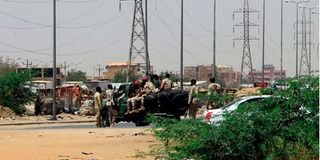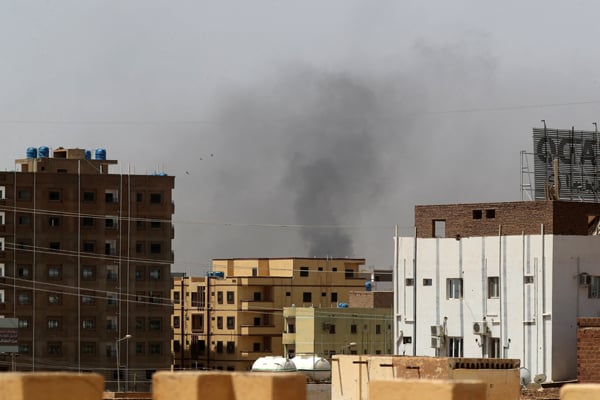Premium
What caused Sudan military clashes?

Army soldiers deploy in Khartoum on April 15, 2023, amid reported clashes in the city. -Sudan's paramilitaries said they were in control of several key sites following fighting with the regular army on April 15, including the presidential palace in central Khartoum.
What you need to know:
- The two wings of Sudan’s security component have had a long running dispute that revolves primarily around their respective gains in the post-overthrow era of former Omar al-Bashir, Sudan’s longtime ruler jettisoned in April 2019.
- The latest round of disagreement, and the reason for their clash, occurred following the signing of the Framework Agreement establishing the transitional period on December 5.
Sudan’s Rapid Support Forces, the paramilitary unit that often runs a parallel command system but says it plays alongside the army, clashed with the country's army on Saturday, leading to fears of a third coup in four years.
The RSF is led by Mohamed Hamdan Dagalo, also known as Hemedti, the deputy leader of the Sovereignty Council, the definitive leadership organ of the junta led by Lt-Gen Abdel Fattah al-Burhan.
Their rifts have been an open secret.
The two wings of Sudan’s security component have had a long running dispute that revolves primarily around their respective gains in the post-overthrow era of former Omar al-Bashir, Sudan’s longtime ruler jettisoned in April 2019. Their tiff is also linked to the personal competition between army chief al-Burhan, and RSF.
The latest round of disagreement occurred following the signing of the Framework Agreement establishing the transitional period on December 5 last year. The junta was to re-sign a deal for a new transitional government led by civilians this month but it collapsed, following internal wrangling.
The framework said the military will quit politics and hand over power to civilians. It also provided for the integration of the RSF into the ranks of the army, a sticky matter that aroused differences.
The rift between Burhan and Hamedti may place the country in a third coup in four years. It threatens the four-year journey of the transitional period since the overthrow of President Omar al-Bashir after the Sudanese revolution in 2019.
In October 2021, Burhan forcibly took over power after dissolving the cabinet of the transitional government led by then Prime Minister Abdalla Hamdok. This isolated the country and saw aid suspended for its key projects. It came just after the US lifted sanctions on Sudan, which would have opened up Khartoum for investors.
Initially, as a junta, the two leaders let their differences boil under the table. It had been common knowledge that their rivalry was playing even in deals they made with outside entities, such as Russia. After the framework was signed, it became an open secret.
But they have also been met with a hardline civilian movement which wants nothing from the military in running the politics of the country. Every other player, including the African Union, the Intergovernmental Authority on Development and the US have demanded a civilian-led government.
As it is, Sudan is suspended from voting at the African Union and the UN, but it chairs IGAD, the regional bloc in the Horn.
So how did the junta crack? Al-Burhan had been trying to isolate Hemedti for a while. One indicator was when Khartoum signed an updated version of the peace agreement with the armed movements in Juba, South Sudan. Sovereignty Council member Shamsuddin Kabbashi signed the agreement on behalf of the government, instead of Hemedti, who had signed the first version with the movements in October 2020.
Al-Burhan also stopped Hemedti from receiving security, diplomatic and criminal reports he had been routinely receiving. In fact, Hemedti was also denied a role in dealing with the country’s peace bids.
But Hemedti isn’t new to the game. Some five years before Bashir'ss ouster, he was consolidating his influence in the capital, Khartoum. He created the RSF, an offshoot of the Janjaweed militia feared for its atrocities in Darfur in the 2003 rebellion, which Bashir crushed and earned an indictment at the International Criminal Court.
RSF was integrated into the formal security service in 2013. And after the coup in 2019, the army and the RSF maintained their relationship against Hamdok's transitional government.
Hamdok won the hostility of the duo, together, after he sought to solve the problems of his country's economy, and eliminate depletion of the local currency, by several decisions including transferring military investments into joint stock companies.
This was rejected by the military, which said instead that those companies pay the prescribed taxes without being put under civilian supervision. Hamdok also clashed with the RSF over an initiative that included attaching those forces to the military and regularising their status. Ultimately, the duo —Hemedti and Al-Burhan— agreed to oust Hamdok in October 2021.
That appears to be last time their interests converged - they have been differing on how to move the transitional programme forward.
They also haven’t agreed on key foreign policy changes such as Hemedti’s controversial decision to meet with Israeli officials without his partner’s knowledge. This was seen as Hemedti’s bid to advance his domestic political agenda by seeking allies abroad. Hemedti has also strengthened ties with Russians and has travelled to that country recently. He is said to enjoy security cooperation for the RSF.
When Hamdok was ousted, Hemedti did not comment publicly even though it was clear he too didn’t like the PM.
He now prefers flirting with the streets by raising demands for change and demanding civil rule. Even if he finally agrees to civilian rule, perhaps he knows playing 'good cop' may save him from any punitive measures on his conduct by the new, civilian-led government.





